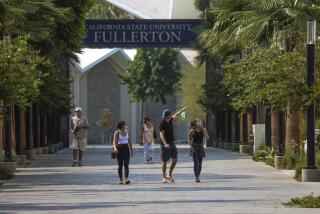GOP Report Says College Tuition Increases Causing ‘Crisis’
- Share via
Two key Republican congressmen will release a report today declaring that the nation’s higher education system is “in crisis” as a result of persistent tuition increases for college students.
The report asserts that tuition increases are outpacing the rate of inflation, family income and state and federal financial aid.
“These cost increases are pricing students and families out of the college market” and forcing others to “trade down” to lesser schools, the report concludes.
The document may represent the first step in an anticipated campaign by Republican lawmakers and the Bush administration to hold colleges and universities more accountable for their cost and performance.
A centerpiece of that push is a legislative proposal intended to limit college tuition increases that is being drafted by U.S. Rep. Howard P. “Buck” McKeon, a Santa Clarita Republican and one of the lawmakers releasing today’s report. His bill is expected to be introduced this month.
McKeon coauthored the House Republicans’ report with U.S. Rep. John A. Boehner (R-Ohio), chairman of the House Education and the Workforce Committee.
Higher education lobbyists and some college finance experts acknowledged Wednesday that students have been jolted by this year’s tuition increases and that universities’ efforts to control expenses have been limited.
But these critics said the report exaggerates the impact of rising tuition by neglecting to take into account the extent to which increased grant aid from colleges and federal and state government have helped students. They also said the report puts too much blame for rising costs on schools, while downplaying the role of a weak economy and state budget crises.
In a prepared statement, U.S. Rep. George Miller of Martinez, the senior Democrat on the House education committee, said: “There are many causes to this problem, one of which is serious funding cuts by the states to their college systems due to the weak economy and huge budget deficits. But as Congress addresses this problem it must avoid the temptation to pass legislation that will create great headlines but offer little relief to students and their families....”
The report comes as students around the country are returning to campus, facing the highest tuition increases in years. Among the biggest percentage increases are those in California, with the California State University and University of California systems each boosting fees by 30% this summer, following midyear hikes of at least 10% last winter. The state’s community colleges, still the nation’s least expensive, boosted fees from $11 a unit to $18 a unit.
The House Republicans’ report says the latest tuition increases reflect not just recent state spending cutbacks, but also a long-standing failure by colleges and universities to control costs. It cited a College Board report showing that in the 10-year period ending in 2002-2003, average tuition and fees climbed 38% faster than consumer prices overall throughout the U.S. economy.
“When times are tough, institutions increase tuition; and when times are good, institutions increase tuition as well,” the report says.
But many researchers who study higher education say the focus on official tuition rates is misleading because growing numbers of students receive “discounts” in the form of federal, state or direct college grants.
In fact, an analysis by a unit of the U.S. Department of Education last year found that, taking grant aid into account, college tuition costs rose no faster than inflation during a seven-year period through most of the 1990s.
Sandy Baum, a Skidmore College economist who specializes in higher education finances and who was critical of the Boehner-McKeon report, said colleges and universities often rely on tuition increases to cover the cost of financial aid for low- and middle-income students.
If lawmakers place limits on tuition increases or provide schools with incentives to limit tuition hikes, she said, it will mean less aid for the neediest students.
More to Read
Get the L.A. Times Politics newsletter
Deeply reported insights into legislation, politics and policy from Sacramento, Washington and beyond. In your inbox twice per week.
You may occasionally receive promotional content from the Los Angeles Times.










